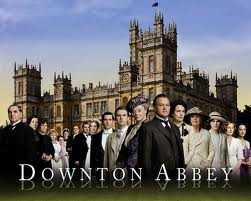
I am thoroughly addicted to Downton Abbey, the PBS Masterpiece theater show going into its fourth season. For those of you who are the uninitiated, let me just say that this is not your prototypical Masterpiece Theater production. I confess that I have in the past been entirely turned off by such programming as I found them a little pretentious, often plodding, and frankly, just uninteresting. What caught my eye was an advertisement for the show that Shirley MacLaine was in the production, and the scene shown was of her character being a feisty American woman who was willing to take on the English aristocracy fearlessly. MacLaine is in but 2 episodes of the third season, and in truth adds only minorly, though importantly, to the entire story.
A good friend of mine, born in New Zealand but claiming England to be his home now, said, when I inquired of him if he had seen the show, it was nothing more than a soap opera and therefore of little consequence. I did not respond to this, deciding that I needed to give consideration to his indictment. In the end, I decided that his statement about it being a soap opera was not false, but it also merits little in the overall consideration of the program. Compared to any prime time show, it stands head and shoulders above anything any of the major networks, including the BBC, is offering these days. And while it has a fair share of technical imperfections such as, why would a wealthy aristocratic family be driving a 1o year-old car even if it was a luxury vehicle at the time it was sold. The vehicle in question is the 1908 Renault (shown below), a beautiful example of European luxury in its day, but something that any well-to-do family would have sold by the time of the opening scene of this show, 1912. But such inaccuracies can be overlooked, though not entirely forgiven, for a story-line that is an important consideration of the English aristocracy at the time.
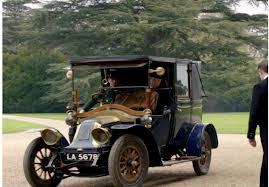
The first two seasons of Downton Abbey take place between 1912 and 1919. We are presented with the “Earl of Grantham” and his American wife trying to deal with the challenges of the day. A Victorian era remnant, the Earl’s mother and a “dowager,” played by the indomitable Maggie Smith, is desperately trying to hold on to the past, the Earl, desperately trying to hang on to the status quo, and his three daughters (shown below), in their late teens and early 20s, trying to navigate the obstacles of their future. We get a rather nice look into the challenges faced not only by the English aristocracy, but of the same challenges American aristocrats of that day were attempting to overcome. To wit, F. Scott Fitzgerald’s novel The Great Gatsby shows us just such a family in 1920s America. And while this show certainly is not of the literary heights of Fitzgerald’s novel, it none-the-less does give us pause to consider the challenges faced, not only by this English family, but of all family life in England from 1912 to 1920. And for a television production, it is quite well written and well acted.
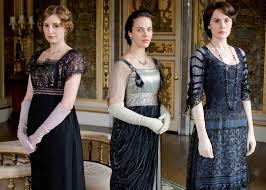
The characters of Downton Abbey are not monolithic, as often happens in television melodramas, but ever-changing people as we might expect. As in any good novel, there are characters we love, hate, question, and change our mind over. They act bravely, foolishly, selfishly, and at times, evilly. The story works hard to bring out the audience’s on biases, prejudices, and identification with the characters presented. The vast number of actors in this show are unknown to American audiences, but they do not leave us wanting for good acting. They draw us in, capture our attentions, and leave us wondering, as should happen. There is no overacting, which is a relief. There is no character so good nor so bad that we can discount them as the ideation of an overactive imagination.
Maggie Smith’s character (shown below), Dowager Countess of Grantham, is what women of her day were, the moral conscience of the family. The dowager is openly contemptuous of the direction of the world, but is able to moderate her actions by her absolute desire to keep her family together by whatever means. She is extremely principled, dogmatic, and never at a loss for a cutting remark. But when you look beyond her opinionated remarks, you find a woman who truly wants only the best for her family, and though she is wont to ever admit to a fault, she frequently moderates her position to achieve her end. If you listen just a little closely, you will find the dowager’s one-liners to be priceless, and frequently very telling. For example, in an early scene, her niece, Lady Sybil, remarks questioningly, “can’t we have our own opinions?” to which the dowager responds, “No! Not until you are married and then your husband will tell you what your opinions are.” In today’s society we would find such a remark shocking but in those days, that is exactly what was expected.
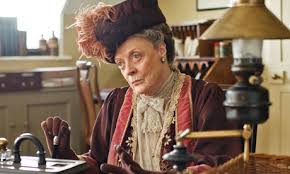
We are given an aristocratic family in transition, even though most of that family is unaware that it is going through such. We are taken, painfully, through the trials of World War I that all English families had to endure. No family in Britain escaped the horrors of that war, and the show does a decent job of showing exactly that. Much is made of what England and its families had to endure during Word War 2, but it all started in World War 1. Many scholars contend that World War 2 was nothing more than an extension of the first war. But the important part that we see in this show is how big an impact that war had on every family. This, so to speak, sets the stage for the second world war.
We are also treated to a personal look at the lives of the Grantham House servants (seen below), of which there are many. We Americans have little to draw on about how such “service employees” existed because, if nothing else, the extensiveness of such servants never existed in this country. But one thing is brought out very well. “To be of service,” as the members of the house’s servants were, was, in its day, thought of as a profession to aspire to and to be extremely proud of. While this sort of person has largely disappeared, as had to happen, it still is a point of fact for the times in which it existed. It gives us another point of reference when considering the aristocracy of that day. And as a historian, I am certain that a fair amount of literary freedom was taken and facts ignored. Still, it gives us a decent starting point if we desire to look further in understanding what happened all those years ago.
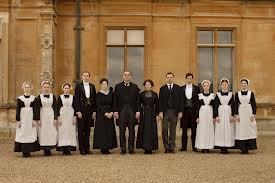
And that is exactly my point. In the years 1912 to 1920 and beyond, not just England, but the world was confronted with quickly changing times amid wars, insurrections, and civil strife. The year 1912 is an excellent starting point if one cares to discover the changes of the early 20th Century. England fought a war and had to contend with Ireland’s desire to be an independent country. Russia went from a Tsarist state to a communist country. The world was being made smaller but inventions such as the telephone and the phonograph, motion pictures, radio, and faster ships. Countries began using, for the first time ever, weapons of mass destruction, mustard gas, tanks, and machine guns to name a few. And with all that, family life had to go on. What that looked like is exactly what this show is all about. It often happened in fits and starts, but it was always challenging at every level, not just the aristocracy. There are many situations of that day brought out that we today consider a matter-of-fact. But in those days the notion of responsibilities of men and women to one-another and their offspring was a far cry from what it is today.
I could not recommend this show more strongly to everyone. Take it with a grain of salt because it is certainly not entirely accurate, but it is entirely entertaining at the very least, and better yet, it should give one pause to consider so many things, not just of what was happening back then, but what is going on today. We have not come so far that we cannot learn anything from what is proffered in this show. In reality, we could learn a lot.













